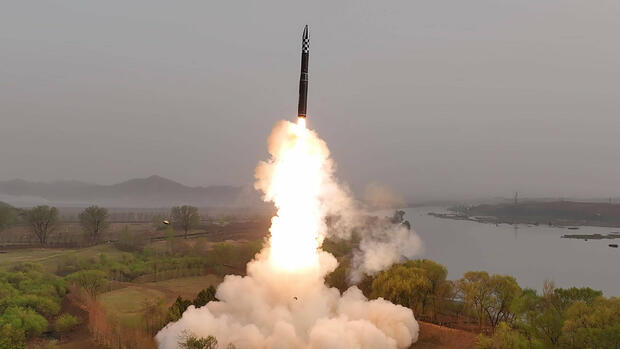North Korea keeps testing rockets and other missiles like here in April.
(Photo: IMAGO/UPI Photo)
Seoul The self-declared nuclear power North Korea has failed in its attempt to launch an earth observation satellite for military purposes for the first time. The country, ruled by Kim Jong Un, conceded the failure on Wednesday, just hours after the launch of the Chollima-1 launch vehicle from the country’s west coast. A second start is already planned.
Despite the fiasco, the USA and South Korea as well as UN Secretary General Antonio Guterres condemned the rocket launch. They accused the largely isolated country of using banned rocket technology. North Korea is subject to international sanctions for its nuclear weapons program.
The rocket launch briefly caused unrest in the metropolis of Seoul: in the South Korean capital, alarm sirens could be heard in the morning (local time), and text messages called on residents to prepare for an evacuation.
The alert was later withdrawn. The Ministry of the Interior said it was a mistake. There was no danger for Seoul.
The South Korean military had previously recorded the launch of the multi-stage rocket in the neighboring country. She flew south. The General Staff later spoke of an “abnormal flight”.
The missile fell about 200 kilometers west of the South Korean island of Eocheong in the Yellow Sea. An object that was probably part of the rocket had been pulled out of the water.
Problems with second stage rocket ignition
The flight of the new rocket with the military reconnaissance satellite “Malligyong-1” initially proceeded normally after the launch from the Sohae launch facility, North Korea’s state media reported, citing the national agency for space development. However, problems then arose with the ignition of the second rocket stage and the rocket lost thrust. The “serious errors” would be investigated in order to follow up as soon as possible with the second satellite launch.
North Korea had announced the launch. Neighboring country Japan has been informed that the launch window is from May 31st to June 11th.
In April, North Korea’s rulers issued instructions to deploy several reconnaissance satellites one after the other in different orbits in order to be able to better counter the “threats” from the USA and South Korea. Pyongyang accuses both countries of hostile policies.
In April of this year, North Korea launched another ICBM for test purposes, which could theoretically also reach US territory. This time it was the country’s first attempt at a satellite launch since 2016 and the first with a suspected spy satellite.
“This alleged space launch used technologies directly related to North Korea’s ICBM program,” the US National Security Council said on Tuesday evening (local time). De-escalation by diplomatic means is still possible, but Pyongyang must stop its provocative actions immediately. The rocket launch increases tensions in the region and could destabilize the security situation.
“Violation of relevant decisions of the Security Council”
Guterres “strongly” condemns the launch of a military satellite, the UN Secretary-General’s spokesman said in a statement. “Any launch using ballistic missile technology violates relevant decisions of the Security Council.”
UN resolutions ban North Korea, which has already conducted several nuclear tests, from launching ballistic missiles of any range. These are usually ground-to-ground rockets, which – depending on the design – can also be equipped with one or more nuclear warheads. After an unprecedented series of missile tests last year, North Korea has again tested nuclear-capable missiles several times this year.
More: Revolt against regulatory zeal – are new EU laws now coming to a halt?
